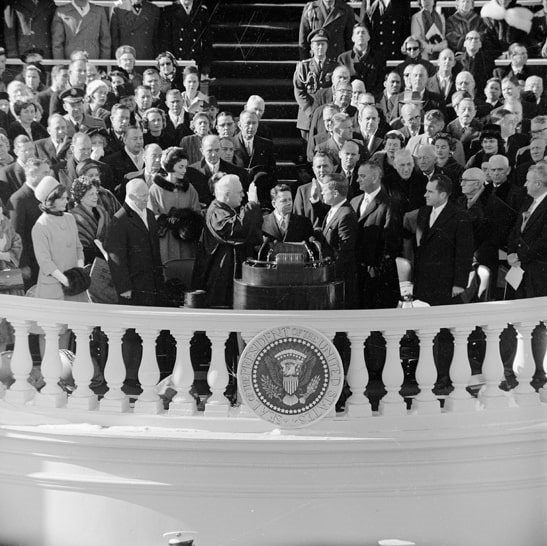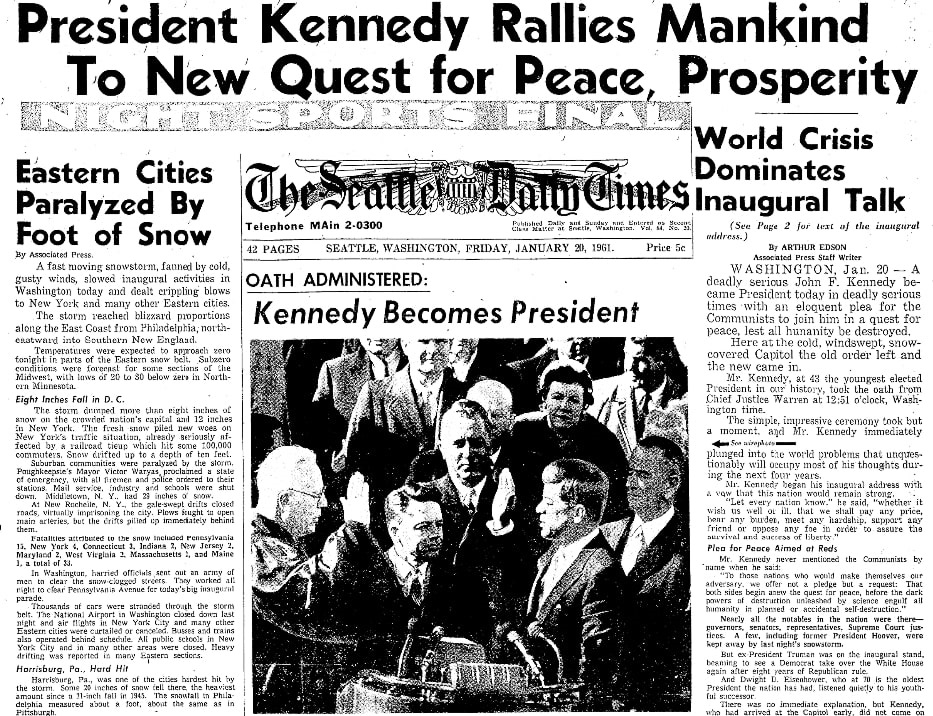The inauguration of John Fitzgerald Kennedy as the nation’s 35th president on 20 January 1961 included several notable achievements. For one, Kennedy at 43 was (and remains) the youngest elected president in American history. He was the first Roman Catholic elected president.
Perhaps his most significant achievement on that cold, raw day in 1961 were his words: he delivered one of the most famous inauguration speeches the nation has ever heard, exhorting his follow Americans to “ask not what your country can do for you; ask what you can do for your country.”

Kennedy was elected president at a tense time in world history, with the Cold War (especially between the U.S. and the Soviet Union) making the world a very dangerous place. (The two superpowers nearly had a nuclear confrontation in Kennedy’s second year as president, during the Cuban Missile Crisis of October 1962.)
In his inaugural speech Kennedy acknowledged the potential danger, remarking: “For man holds in his mortal hands the power to abolish… all form of human life.” Despite this, he presented an optimistic vision of the world uniting against the “common enemies of man: tyranny, poverty, disease, and war itself.”

Here is a transcription of this article:
President Kennedy Rallies Mankind to New Quest for Peace, Prosperity
World Crisis Dominates Inaugural Talk
By Arthur Edson
Associated Press Staff Writer
WASHINGTON, Jan. 20 – A deadly serious John F. Kennedy became President today in deadly serious times with an eloquent plea for the Communists to join him in a quest for peace, lest all humanity be destroyed.
Here at the cold, windswept, snow-covered Capitol the old order left and the new came in.
Mr. Kennedy, at 43 the youngest elected President in our history, took the oath from Chief Justice Warren at 12:51 o’clock, Washington time.
The simple, impressive ceremony took but a moment, and Mr. Kennedy immediately plunged into the world problems that unquestionably will occupy most of his thoughts during the next four years.
Mr. Kennedy began his inaugural address with a vow that this nation would remain strong.
“Let every nation know,” he said, “whether it wish us well or ill, that we shall pay any price, bear any burden, meet any hardship, support any friend or oppose any foe in order to assure the survival and success of liberty.”
Plea for Peace Aimed at Reds
Mr. Kennedy never mentioned the Communists by name when he said:
“To those nations who would make themselves our adversary, we offer not a pledge but a request: That both sides begin anew the quest for peace, before the dark powers of destruction unleashed by science engulf all humanity in planned or accidental self-destruction.”
Nearly all the notables in the nation were there – governors, senators, representatives, Supreme Court justices. A few, including former President Hoover, were kept away by last night’s snowstorm.
But ex-President Truman was on the inaugural stand, beaming to see a Democrat take over the White House again after eight years of Republican rule.
And Dwight D. Eisenhower, who at 70 is the oldest President the nation has had, listened quietly to his youthful successor.
There was no immediate explanation, but Kennedy, who had arrived at the Capitol early, did not come on to the inaugural stand until 12:12 p.m. – 12 minutes late.
Even then the program was not ready to begin, and there was considerable milling about on the platform.
Kennedy Ignores Delay
Mr. Eisenhower and Mr. Kennedy did not seem to mind. They chatted amiably and at times energetically.
Neither smiled much. Mostly, Mr. Kennedy listened soberly, squinting into the sunlight made exceptionally bright by the snow.
The program finally got underway – 20 minutes late.
There were the prayers from leaders of four faiths, Roman Catholic, Protestant, Jewish and Greek Orthodox.
There were the stirring, martial music, the singing, and, an unusual event at inaugurations, a poem read by Robert Frost.
Finally, came the taking of the oaths.
Lyndon B. Johnson took his oath first, from House Speaker Rayburn.
Mr. Kennedy slipped out of a topcoat protecting him against the 22-degree weather and stepped forward.
Facing Chief Justice Warren, and speaking in a loud, clear voice, he repeated the simple words, and took on the awesome job of leadership in this dangerously troubled world.
Familiar Gestures Used
Mr. Kennedy delivered his speech with the finger-pointing, hand-chopping gestures which became so familiar during the political campaign.
Even as he painted the grim picture of the world today, he was soberly confident.
“I do not shrink from this responsibility – I welcome it,” he said.
Mr. Kennedy was interrupted 14 times in his 14-minute address.
Mrs. Kennedy’s eyes seldom left her husband as he spoke. She gazed at him with a smile of pride.
Note: An online collection of newspapers, such as GenealogyBank’s Historical Newspaper Archives, is not only a great way to learn about the lives of your ancestors – the old newspaper articles also help you understand American history and the times your ancestors lived in, and the news they talked about and read in their local papers. The same is true of more recent news.
Related Articles:
